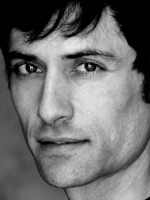Column Name
Title
Musician, actor, writer, and filmmaker Paul Festa, who earned an Advanced Certificate in violin from Juilliard in 1993 before graduating with honors in English from Yale University in 1996, is a self-proclaimed Messiaen obsessive.Festa's projects on the French composer—whose centenary is this month—include the book Oh My God: Messiaen in the Ear of the Unbeliever; a recent recital, with Juilliard faculty member Jerome Lowenthal, of the complete Messiaen violin and piano works at the Library of Congress, featuring the D.C. premiere of the newly publishedFantaisie on the "Betts" Stradivarius; and a 30-city tour with his first film, Apparition of the Eternal Church.
Body
The internationally acclaimed documentary is a compilation of 31 mostly nonreligious artists responding to Messiaen’s religiously steeped organ work, Apparition of the Eternal Church, and attempts to answer the question: what does Messiaen’s passionately Christian music sound like to non-Christians? Listeners, who range from the late Juilliard professor Albert Fuller to Broadway stars and drag queens, aren't told anything about the work prior to hearing it. In the absence of Messiaen’s theological program, respondents are able to provide their own commentary; they allude to childhood, architecture, and literature, even as they conjure a distinctly "Messiaenic" vision of damnation and spiritual ecstasy.
What drew you to Messiaen’s music?
I played the Quartet for the End of Time at Juilliard, but frankly the piece never really got under my skin. It wasn’t until 10 years later when I checked out a CD of French organ music from the municipal library in Lake Forrest, Ill., that I heard Messiaen’s Celestial Banquet and got hooked. I thought, “I have to hear all the works Messiaen wrote for organ.” Deutsche Grammophon had just issued exactly that, and the first track on the first disc is the Apparition of the Eternal Church. When I first heard it I felt like I was going out of my body, like I was having a religious experience, and as a secular Jew from Northern California with no experience with organized religion it was very moving and exciting.
What about Messiaen’s music evokes such emotional responses?
First of all, most people don’t have profound emotional responses to this piece other than they hate it. I interviewed 115 people, and even of the ones that ended up in the film there were many negative, defensive responses, including my old violin teacher [Robert Mann]. So it’s not necessarily a question of whether or not someone is musically sophisticated. What I personally love about Messiaen is that he’s so excessive. He will take you to the nth degree and then push you, not a little further but way further. He keeps crossing the boundary, and it takes a certain amount of innocence to keep going there with him.
Do you see moving beyond this musical boundary as having theological implications?
Yes, absolutely. When I say I had a religious experience, I mean that Messiaen is always taking you to the end, and then making you realize that the end is not the end. For someone who believes in eternal life, showing you the end and pushing you past that threshold is a theologically meaningful statement, and for me is at the heart of my experience of the sublime in Messiaen’s music.
What Messiaen created [in Apparition] challenges the limits of our perception while giving a glimmer of transparency. It’s like looking into a Magic Eye, where if you can see into the 3-D, the computer graphic becomes a comprehensible image, and if you can’t, it’s a wash. With Messiaen it’s the same: you need binocular vision to see the image itself, and you’re always almost there, but always ultimately foiled. That is Messiaen’s way of showing you that there is an order to existence, an order to creation, one that a divine consciousness can understand perfectly, but one that we are only at the threshold of.
Numerous listeners referred to the ecstasy of spirituality, but there seemed to be an equal number of opposite reactions, where people evoked images of torture, hell, and eternal suffering. Where does the dialectic stem from?
I think it’s in the music, I think it’s in Catholicism, and furthermore, I think it’s in religion itself. When you finally hear the music at the end of the film, for example, at the apex of the piece, when Messiaen lands on that C-major chord, which is the most exalted and ecstatic sound you can make on the organ when all the stops are pulled, you have superimposed text [from José Saramago’s novel] describing the miserable deaths of the martyrs in alphabetical order, while seeing one listener with this expression of absolute ecstasy, erotic, orgasmic ecstasy, on her face, and another with his eyes rolled back into his head. This is all in that C-major chord and in the experience of religious ecstasy.





